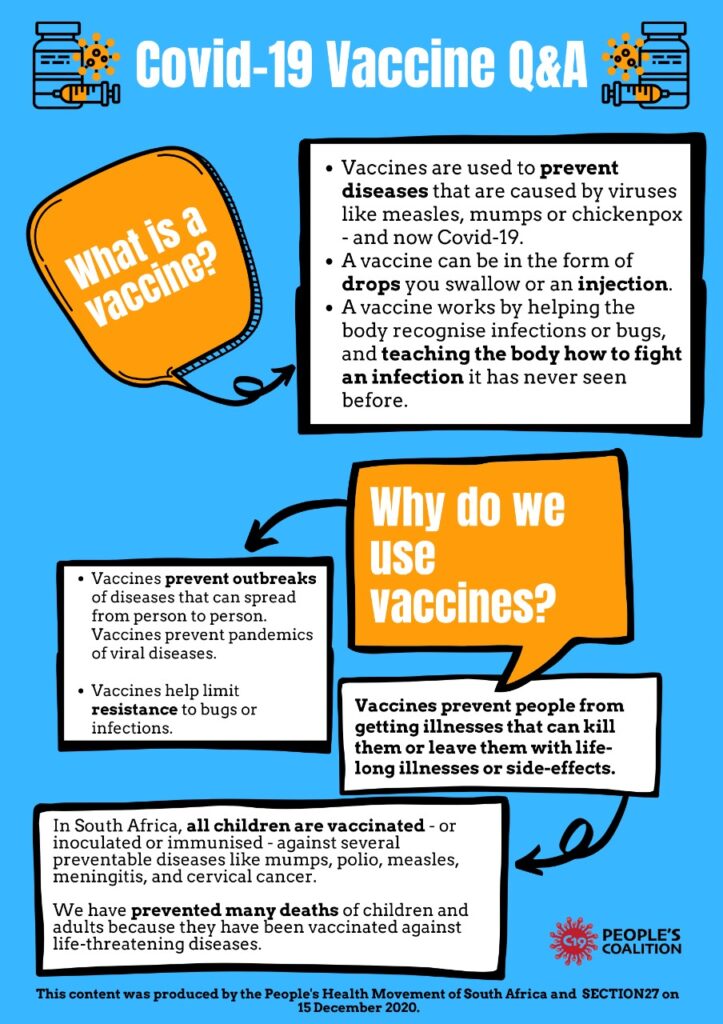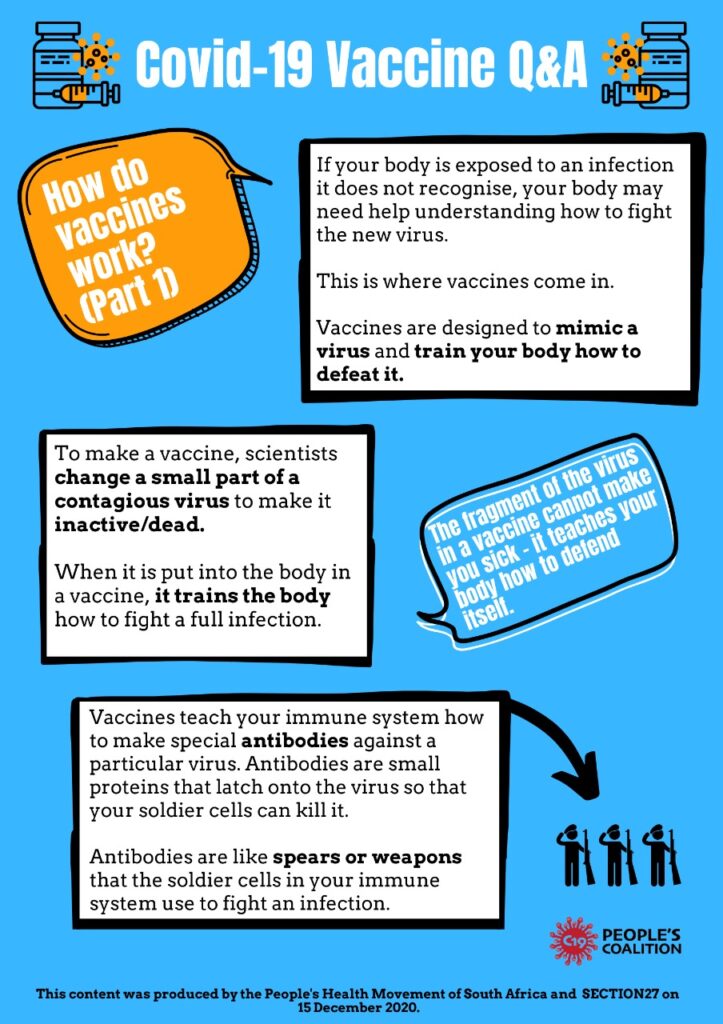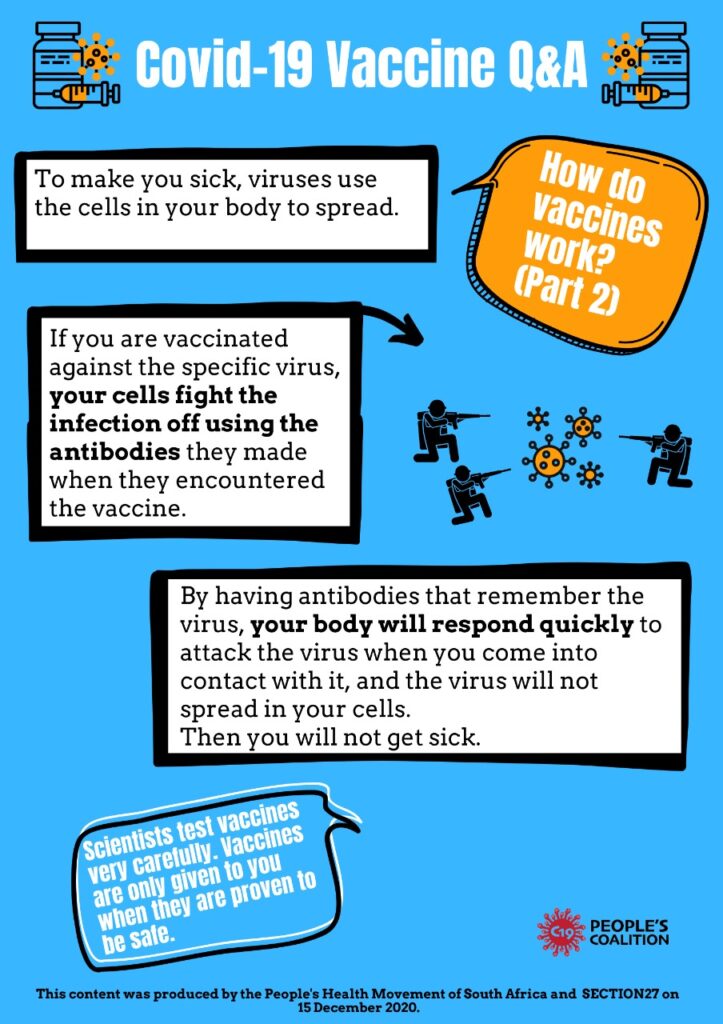South Africa’s government cannot handle the COVID-19 vaccine rollout alone, these activists say. That’s why it’s time for citizens to get involved in this ‘life or death’ issue.
Resource details:
Publication title: Towards a people’s vaccine campaign – a call to action
Author(s): C19 People’s Coalition
Publication date: 12 January 2021
What the statement is about:
The C19 People’s Coalition is a civil society organisation set up in March 2020 in response to the coronavirus pandemic. Its members include various structures including trade unions and nonprofit organisations. The coalition aims to make sure South Africa’s COVID-19 response is “rooted in social justice” and prioritises those who are most vulnerable. Their call to action encourages South Africans to get on board to ensure inoculation against the virus happens in an equitable way. The people of South Africa must play an active role in this project, the Coalition argues, to ward against government corruption, cronyism, and the profiteering motives of the private sector.
Key take-aways from the call to action:
C-19’s seven threats to South Africa’s vaccine rollout programme
- Health budget cuts – Getting vaccines to people will require a huge cash injection to South Africa’s health system for health workers, storage, and equipment. But the government has made budget cuts that will directly impact the state’s capacity to deliver a national vaccination programme, including a R10-million reduction in the health allocation until 2022.
- Healthcare inequality – Only 16% of the country can afford medical aid premiums while the rest of the nation relies on a dilapidated, inefficient public health system, or pays for private services out of pocket when necessary. In the absence of a National Health Insurance scheme, which was envisioned to bridge this gap but remains unimplemented, the capabilities of both sectors will be crucial to the success of the Coalition and the country’s vaccine rollout. Read about the strained relationship between the two sectors here.
- The World Trade Organisation’s rules about intellectual property – The intergovernmental organisation protects patent rights on new medicines and medical devices, an arrangement that has historically created barriers in accessing life-saving medicines. South Africa and India took a stand for these rules to be waived for the COVID-19 pandemic to accelerate COVID-19 responses in the Global South. Read more about the move here, and why other African leaders should back it.
- Vaccine nationalism and xenophobia – Developed nations such as the United States and Canada have ordered more vaccines than they need to cover their populations. Some countries have also refused to vaccinate migrants and asylum seekers, something the Coalition argues South Africa’s rollout plan must avoid.
- Community health workers’ place in the health sector – These workers were recruited to supplement South Africa’s health system, but they are still underpaid, with little job security and personal protective equipment. This cadre will be crucial to the country’s vaccine rollout and should be supported accordingly. Read about their role in South Africa’s COVID-19 response here.
- Discrimination against women – The impact of the pandemic had affected women disproportionately, who bear the double infection risk as a result of taking on care roles in the family, and having to go out to work to support their households. South Africa’s vaccine rollout must take this into account.
- Disinformation about vaccines – Fear mongering on social media and by politicians has set the scene for anti-science sentiment to spread. South Africa will need more than just government messaging – the country will require a misinformation campaign that is multli-lingual and promotes respectful discussion and communication.

What is the People’s Vaccine Campaign’s mission?
- The Campaign will challenge the government’s budget cuts. “Austerity in a time of a pandemic is self-defeating,” they argue. The organisation calls for increased health spending and full-time public sector employment of all the country’s community health workers.
- The activist organisation demands that vaccines be declared a public good and that non-disclosure agreements with pharmaceutical companies be lifted to promote fair access to COVID-19 technology and medicine.
- The Campaign will demand that civil society be included in meetings and committees set up regarding the vaccine rollout.
- The organisation will combat disinformation about COVID-19 vaccines through national information programmes. The statement reads: “We learnt with HIV/AIDS that disinformation, quackery and deliberate spreading of false and misleading anti-science sentiment will cost us lives. Lives now depend on trust-building.”

Here’s how you can get involved:
- Click here to endorse their call to action as an individual or an organisation.
- Or, add your details to the Coalition’s database to stay in the loop with their projects.
- Do you have questions? Email [email protected].





